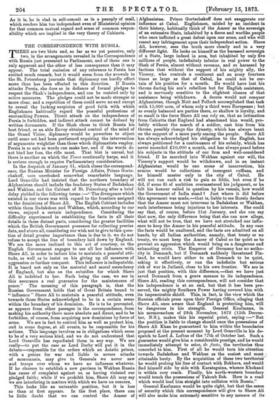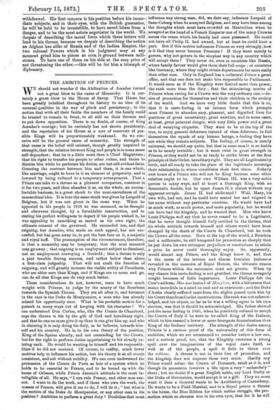THE CORRESPONDENCE WITH RUSSIA.
THERE are two blots and, so far as we yet perceive, only two, in the arrangements revealed in the Correspondence with Russia just presented to Parliament, and of these one is only apparent and the other of less consequence than it may appear. The total omission of any reference to Persia has excited much remark, but it would seem from the avowals in the St. Petersburg journals that diplomacy can hardly effect more than has been effected in this direction. If Russia attacks Persia, she does so in defiance of formal pledges to respect the Shah's independence, and can be resisted only by active measures. The pledges could not be made stronger or more clear, and a repetition of them could serve no end except to reveal the lurking suspicion of good faith with which Englishmen habitually regard the peaceful professions of encroaching Powers. Direct attack on the independence of Persia is forbidden, and indirect attack cannot be defined by written documents. If the Shah chose to think Russia his best friend, or an able Envoy obtained control of the mind of the Grand Vizier, diplomacy would be powerless to object until some act had been performed requiring the intervention of arguments weightier than those which diplomatists employ. Persia is as safe as words can make her, and if the words do not bind her foes, the rifle must. That blot is unreal, but there is another on which the Times continually harps, and it is serious enough to require Parliamentary consideration.
In the despatch of January 31, which closes the correspond- ence, the Russian Minister for Foreign Affairs, Prince Gorts- chakoff, uses unrebuked somewhat remarkable language. Lord Granville had insisted that the northern boundary of Afghanistan should include the feudatory States of Badakshan and Wakhan, and the Cabinet of St. Petersburg after a brief delay yielded in the following terms :—" The divergence which existed in our views was with regard to the frontiers assigned to the dominions of Shere Ali. The English Cabinet includes within them Badakshan and Wakhan, which, according to our
views, enjoyed a certain independence. Considering the difficulty experienced in establishing the facts in all their details in those distant parts, considering the greater facilities which the British Government possesses for collecting precise data, and above all, considering our wish not to give to this ques- tion of detail greater importance than is due to it. we do not 'refuse to accept the line of boundary laid down by England. We are the more inclined to this act of courtesy, as the English Government engages to use all her influence with Shore Ali, in order to induce him to maintain a peaceful atti- tude, as well as to insist on his giving up all measures of aggression or further conquest. This influence is indisputable. It is based not only on the material and moral ascendancy of England, but also on the subsidies for which Shere All is indebted to her. Such being the case, we see in this assurance a real guarantee for the maintenance of peace." The meaning of this paragraph is, that the Russian Government holds that of Great Britain bound to " influence " Shere All to maintain a peaceful attitude, even towards those States acknowledged to be in a certain sense within the boundary of his dominion. He is to be prevented, as appears from other passages in the correspondence, from making his authority there more absolute and direct, and to be forbidden, of course, from acquiring new dominions by force of arms. We are in fact to control him as well as protect him, and in some degree, at all events, to be responsible for his actions. This language involves us in obligations which seem to be of a very serious kind, and we do not understand that Lord Granville has repudiated them in any way. We are really—to put the case as Lord Derby will put it in the debate—responsible for the orders which an Asiatic prince, with a genius for war and liable to severe attacks of monomania, may give to Generals we never saw and troops over whom we have no influence whatever. If he chooses to establish a new garrison in Wakhan Russia has cause of complaint against us, as having violated our pledged faith; while if we prohibit him, Shere Ali may say we are interfering in matters with which we have no concern.
This looks like an untenable position, but it is less so than at first appears. In the first place, there can be little doubt that we can control the Ameer of
Afghanistan. Prince Gortschakoff does not exaggerate our influence at Cabul. Englishmen, misled by an incident in their history, habitually think of the Ameer as the sovereign of an extensive State, inhabited by a fierce and warlike people who once inflicted a great defeat upon our arms, and who will resent any infringement upon their independent action. Share Ali, however, sees the truth more clearly and in a very different light. He looks on himself as the harassed sovereign of a State, large indeed in area, but inhabited by only five millions of people, indefinitely inferior in real power to the Shah of Persia, almost without revenue, and so harassed by factions that without the support of his mighty ally, the Viceroy, who controls a continent and an army fourteen times as large as that of Cabal, he could not be cer- tain of his position for a month. He would have lost his throne during his son's rebellion but for English assistance, and is nervously sensitive to the slightest chance of that assistance being withdrawn. A decree would not conquer Afghanistan, though Nott and Pollock accomplished that task with 15,000 men, of whom only a third were Europeans ; but so evenly balanced are parties there, so shallow is loyalty, and so small is the force Shore All can rely on, that an intimation from Calcutta that England had abandoned him would, pro- bably without the march of a soldier, cast him from his throne, possibly change the dynasty, which has always leant on the support of a mere party among the people. Shere Ali has always acknowledged his obligation to the English, has always petitioned for a continuance of his subsidy, which has never exceeded £10,000 a month, and has always posed before his subjects in the attitude of our firm and well-considered friend. If he marched into Wakhan against our will, the Viceroy's support would be withdrawn, and in an instant Afghanistan would be one scene of insurrection, his armies would be collections of insurgent ruffians, and he himself master only in the city of Cabal. He will not run such a risk to gain so little, but even if he did, if some fit of ambition overmastered his judgment, or he felt his honour called in question by his vassals, how would the Government of India stand? Just where it did before this agreement was made,—that is, liable to see Russia declare that the Ameer must not intervene in Badakshan or Wakhan, such interference being injurious to her interests. She could say that, of course, before 31st January, and she can say that now, the only difference being that she can now allege, what will not be true, that we have not stretched our influ- ence to keep the Ameer in his peaceful attitude. In any case the facts would be unaltered, and the facts are admitted on all hands, by all Indian authorities, namely, that treaty or no treaty, we must keep the Ameer of Cahill so far quiet as to prevent an aggression which would bring on a dangerous and exhausting crisis. The Emperor of Germany has no autho- rity in Denmark, but if Denmark suddenly threatened Fin- land, he would have either to ask Denmark to be quiet, asking it effectively, or run the indefinite but serious risk of war in Jutland, close to his own frontier. We are in just that position, with this difference,—that we have just saved Denmark from a grave menace to its independence. Shere Ali, reading this correspondence, will not consider that his independence is at an end, but that it has been pre- served, the mighty Southern Power having covered him with its impenetrable shield. This, in fact, is the view which the Russian officials press upon their Foreign Office, alleging that Shere Ali, once aware that England is protecting him, will be dangerous in his strength. General Kaufmann, in his memorandum of 29th November, 1872 (13th Decem- ber, N.S.), makes this his especial point, saying :—" But the position is liable to change should once the possessions of Shere All Khan be guaranteed to him within the boundaries proposed at the present moment by Lord Granville in his de- spatch to Lord A. Loftus of the 17th of October last. Such a guarantee would give him a considerable prestige, and be would immediately attempt to seize, de facto, the territories thus conceded to him. First of all he would turn his attention towards Badakshan and Wakhan as the easiest and most attainable booty. By the acquisition of these two territories he would prolong his line of contact with Bokhara, and would find himself side by side with Karategnina, whence Khokand is within easy reach. Finally, his north-western boundary would touch the possessions of Yalroub Bek. Here is a road which would lead him straight into collision with Russia."
General Kaufmann would be quite right, but that the sense of security which this correspondence will give to Shere All will also make him extremely sensitive to any menace of its withdrawal. His first concern is his position before his imme- diate subjects, and in their eyes, with the British guarantee, he will be held to be irresistible, to have saved Islam from a danger, and to be the most astute negotiator in the world. We despair of describing the moral force which these letters will lend to his throne, because we despair of describing the notion an Afghan has alike of Russia and of the Indian Empire, the two colossal Powers which in his judgment may at any moment grind him to pieces as corn is ground between mill- stones. To have one of them on his side at the easy price of not threatening the other,—this will be for him a triumph of diplomacy.



































 Previous page
Previous page